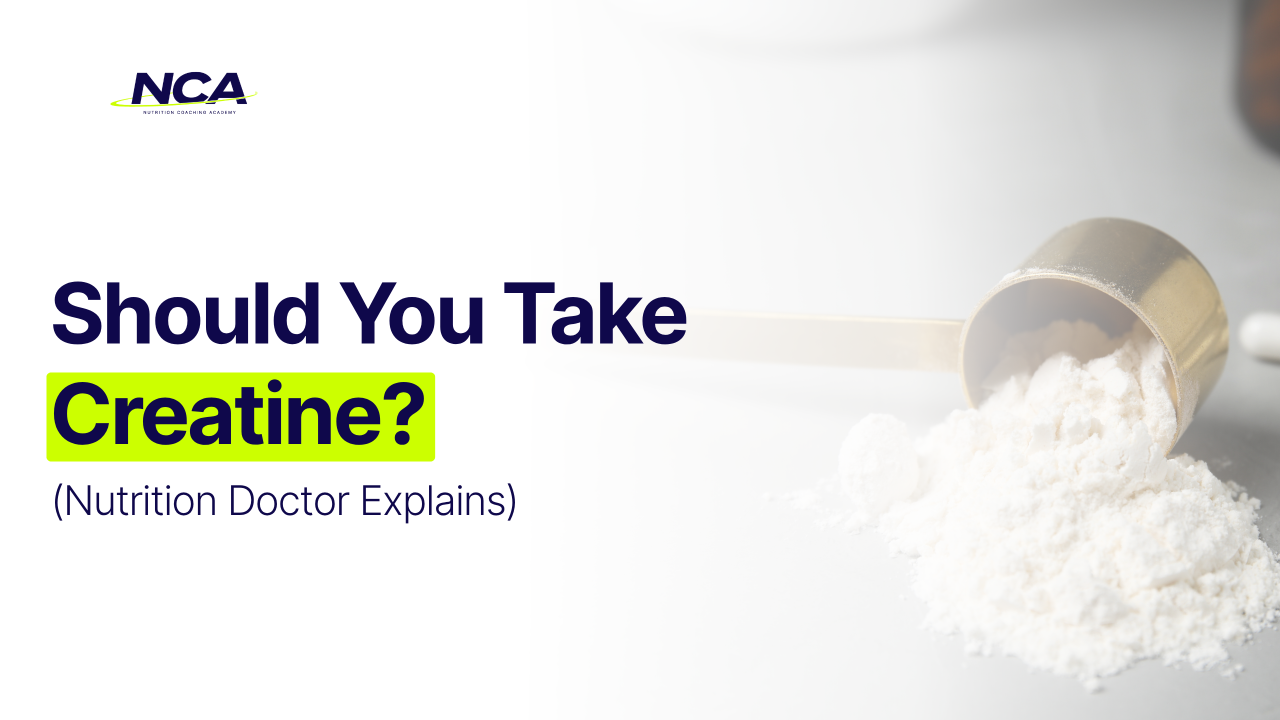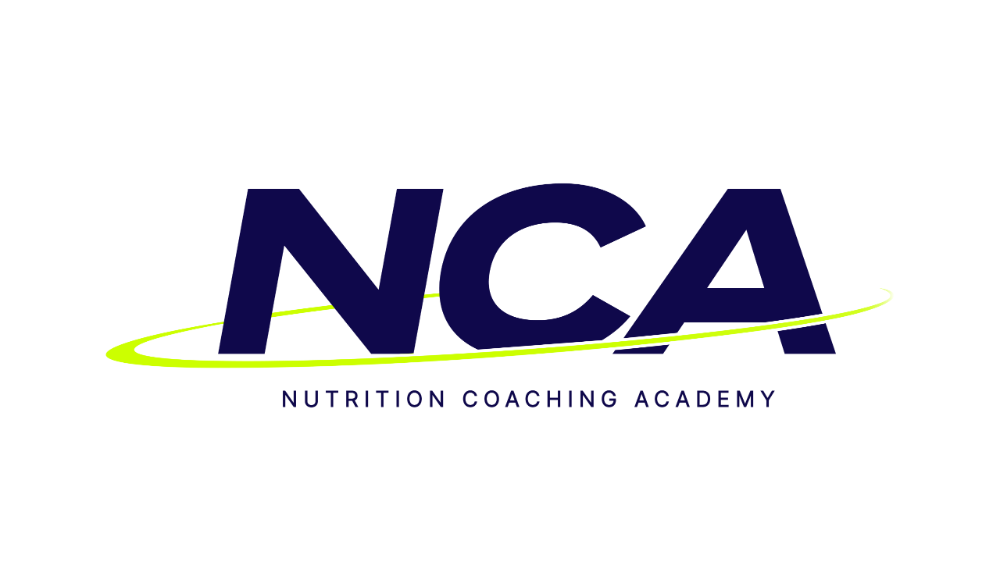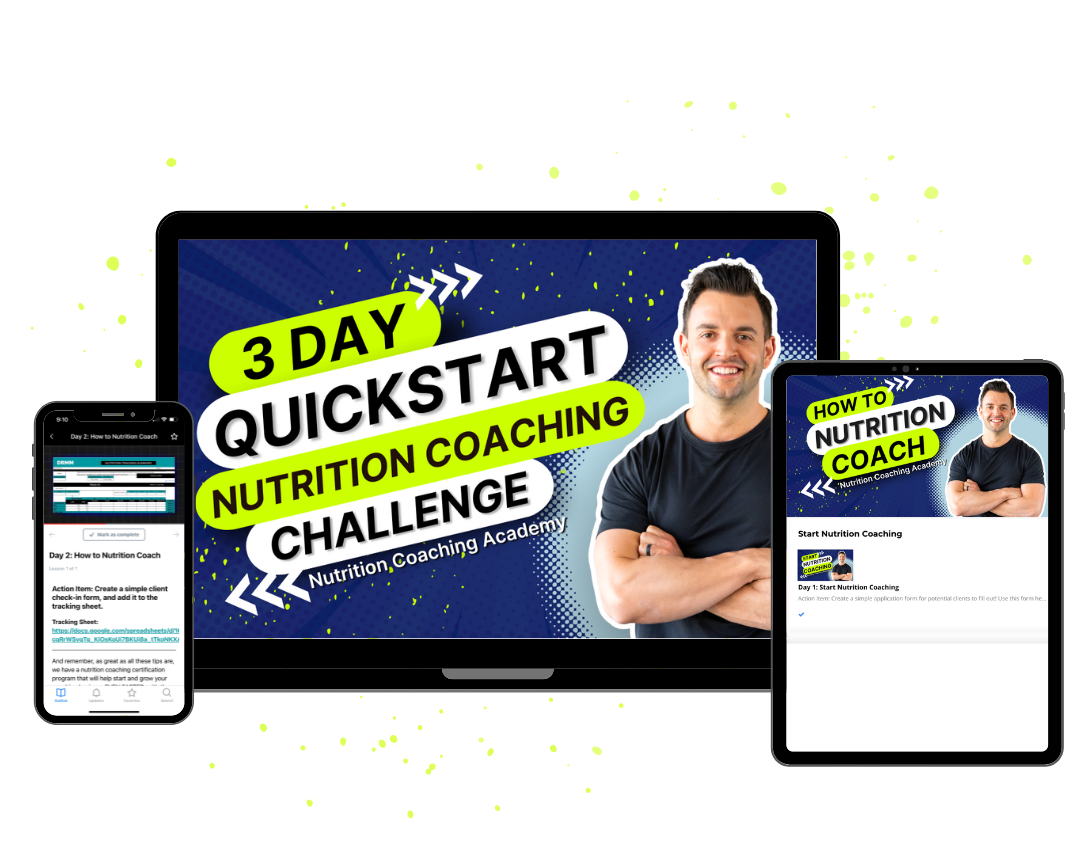Should You Take Creatine? (Nutrition Doctor Explains)
Jul 11, 2025
If you’re starting your fitness journey, you’ve probably heard about a supplement called “Creatine.”
You’re also probably wondering if it’s worth taking, and what it actually does.
Good news: today I’m going to answer that question and break down everything you need to know about creatine, including whether or not it’s right for you.
What is Creatine?
Let’s start by clearing one thing up: creatine isn’t a steroid. It’s a natural compound your body makes from amino acids, and you also absorb it from foods like red meat and fish.
About 95% of your creatine is stored in your muscles. It helps create ATP, your body’s quick energy source. You burn through ATP when you sprint, jump, or lift something heavy (basically, any short burst of high effort). Creatine helps replenish ATP quickly during those movements.
Most people don’t naturally have a lot of creatine, which is why supplementing can boost your levels by 20 to 40%. That’s how it improves strength, performance, and recovery during your workouts.
How Creatine Works

Here’s a real-life example of how creatine makes a difference:
You know when you’re lifting and hit the last rep of your set? That one rep can be the difference between stalling out and making progress. Creatine gives you the edge to push through, and over time, that adds up to bigger gains.
But it’s not just for lifters. Research shows creatine helps with sprinting, explosive team sports, and even endurance training.
Creatine Benefits in Different Areas

Muscle Growth and Strength
Creatine is the most studied and most effective supplement for building muscle. In one 8-week study, lifters taking creatine gained significantly more muscle and lowered myostatin, a hormone that blocks muscle growth. One group gained 5.7 pounds of muscle and added 70 pounds to their leg press.
It’s not just for men either. One study showed women taking creatine gained 60% more lean mass compared to strength training alone.
Prevents Muscle Loss as You Age
Creatine isn’t just for young athletes. It may be even more important as you get older.
Muscle loss begins around age 30 and speeds up after 60. Creatine can slow or even reverse this process. In one meta-analysis, older adults who trained 2 to 3 times a week and took creatine gained 3 more pounds of lean mass than those who didn’t. That extra muscle supports strength, mobility, balance, and independence. All support a longer, healthier life.
Brain Function and Mental Fatigue
Beyond the gym, creatine supports brain health too.
Your brain uses tons of energy, and creatine helps it work more efficiently. Low brain creatine is linked to fatigue, memory problems, and neurological decline. Supplementing can help improve these areas and may even support mood.
One surprising benefit is that creatine helps reduce mental fatigue in sleep-deprived people, improving reaction time and alertness. Early research is even looking at creatine’s role in Alzheimer’s, Parkinson’s, and brain injuries.
Vegetarians and Vegans Benefit More
If you eat a plant-based diet, creatine is a must.
Studies show vegetarians have 15 to 20% lower creatine stores. When they supplement, their strength, memory, and performance improve even more than meat-eaters. For many vegans and vegetarians, creatine is the one supplement that levels the playing field both in the gym and cognitively.
And yes, there are vegan creatine sources, so you don’t have to compromise your values.
Myth-Busting: Is Creatine Safe?

Does it harm your kidneys?
No. While creatine increases creatinine, a marker used to assess kidney function, in healthy people even at doses up to 30 grams per day for 5 years, no harm has been found.
Does it cause dehydration or cramps?
Nope. In fact, some studies show it reduces the risk of cramps and dehydration, even in hot environments.
Does it cause weight gain?
Yes, but mostly from water in your muscles. Over time, weight gain comes from muscle, not fat.
Does it cause hair loss?
No clinical evidence supports this claim.
What about acne?
Not creatine’s fault. If you're training harder and sweating more, that can cause breakouts, but it’s not the supplement.
Want to Learn More?
Watch the full video to learn more about intermittent fasting!
Who Shouldn’t Take Creatine?
If you have diagnosed kidney disease or take medications affecting your kidneys, liver, or blood sugar, talk to your doctor first.
Same goes if you’re pregnant or breastfeeding. There isn’t enough long-term data yet, so it’s best to play it safe.
Many bottles say not to take creatine under age 18, but that’s more for legal safety than science. Creatine use in teens is common, and at doses under 30 mg per kg of bodyweight, it appears safe.
Why Creatine Monohydrate is King
Creatine Monohydrate is the original and still the best option.
Here’s why:
-
It has the most research (over 1,000 studies)
-
It’s cheap (about 6 cents per serving)
-
It’s easy to find
-
It’s just as effective or better than newer versions
Other types like creatine HCL or buffered creatine are marketed as better, but they cost 2 to 3 times more and don’t outperform monohydrate in any study.
How to Take Creatine

You’ve got two options:
1. Loading phase: Take 20 grams per day (split into 4 doses) for 5 to 7 days, then 3 to 5 grams per day to maintain.
2. No loading: Take 3 to 5 grams per day consistently. Same results, just takes longer.
Timing doesn’t matter. Just take it every day.
Who Should Take It?

Still think creatine is just for bodybuilders? Think again.
-
Lifters: more strength and muscle
-
Endurance athletes: faster finishes and better recovery
-
Older adults: muscle preservation and balance
-
Women: better mood, cognition, and bone health
-
Vegans and vegetarians: improved strength and brain performance
-
Chronic illness: with supervision, it may support rehab and reduce inflammation
It’s even been used safely with children in medical settings for muscle loss and brain health.
Beyond the Gym

Recent research shows creatine may also:
-
Reduce triglycerides and LDL cholesterol
-
Lower liver fat
-
Improve insulin sensitivity and blood sugar
-
Act as an antioxidant and reduce inflammation
-
Relieve joint pain in osteoarthritis
-
Slow progression of some cancers
-
Improve quality of life in people with depression or chronic fatigue
The bottom line is that creatine is becoming more than just a sports supplement. It’s shaping up as a tool to improve quality of life on multiple levels.
More FAQs
Do I need to cycle it?
No, you can take it year-round.
What happens if I stop?
You’ll gradually lose the performance boost after 4 to 6 weeks, but there’s no withdrawal.
Does creatine affect sleep?
There’s no evidence it disrupts sleep. It may actually help with recovery after poor sleep.
When should I start?
If you’re training consistently and eating decently, today is a great time to start.
Final Thoughts
Creatine isn’t magic. It won’t do the work for you. You still need to lift, eat well, and sleep.
But if you want something cheap, safe, and scientifically proven to help you perform better, recover faster, and stay healthier as you age, creatine is the best path to go down.



